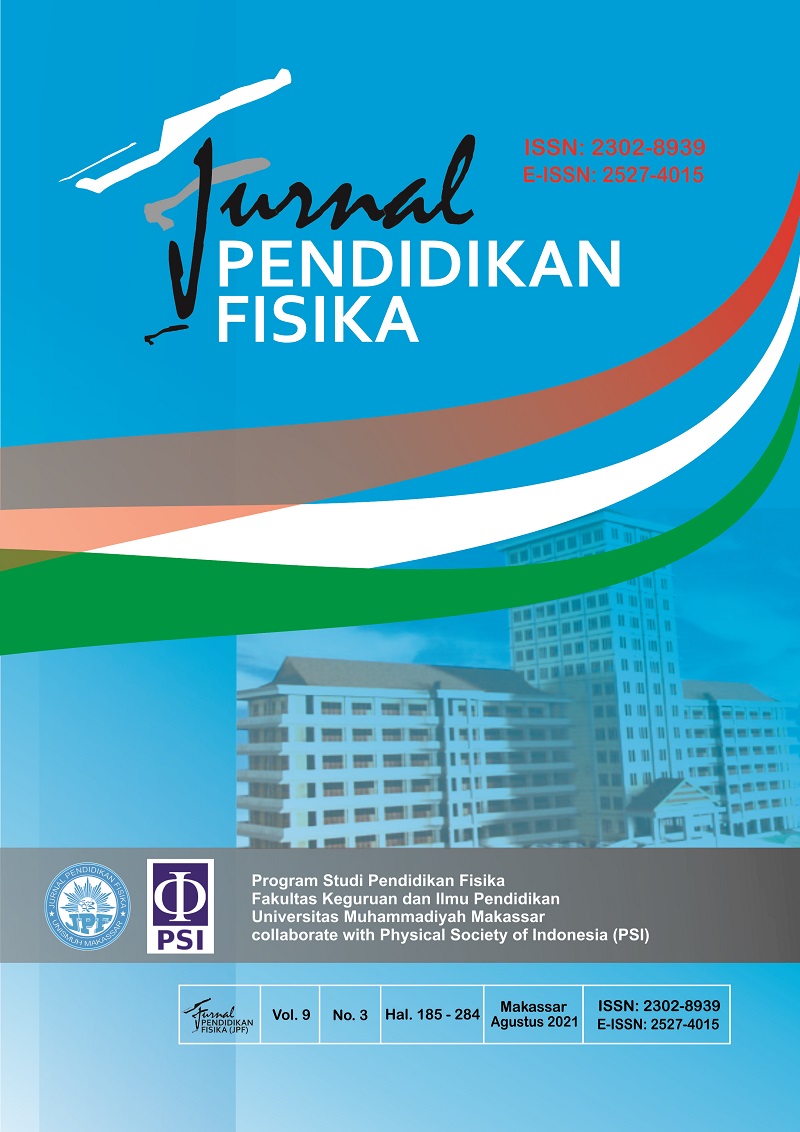The Application of Online Learning Assisted with Quizizz Educational Games in Learning Physics
DOI: https://doi.org/10.26618/jpf.v9i3.5195
Educational games, Learning Outcomes, Online Learning, Quizizz
Abstract
This study aims to determine student learning outcomes at SMA Negeri 21 Makassar before and after implementing online learning assisted by the educational game Quizizz. This research is a pre-experimental research. The total subjects of this study were 31 students. The data collection technique used was a multiple choice test with straight motion material. The collected data was then processed using descriptive statistical analysis and N-gain test analysis. The results showed that there was an increase in student learning outcomes after the application of online learning assisted by the educational game Quizizz from 13.42 to 23.98. The conclusion obtained is that online learning assisted by the educational game Quizizz is effective for improving student learning outcomes.References
Aini, Y. (2019). Pemanfaatan media pembelajaran quizizz untuk pembelajaran jenjang pendidikan dasar dan menengah di bengkulu. Jurnal Kependidikan 25(2), 1-7.
Astini, N. (2020). pemanfaatan teknologi informasi dalam pembelajaran tingkat sekolah dasar pada masa pandemi COvid-19. Jurnal Lampuhyang, 11(2), 13-25.
Aminah, S. (2018). Efektivitas metode eksperimen dalam meningkatkan hasil belajar pada pembelajaran ilmu pengetahuan alam di sekolah dasar. Jurnal Indragini 1(4).
Basuki, Y. (2020). Panduan mudah quizizz. Malang: Azhar Publisher.
Dakhi, A. (2020). Peningkatan Hasil Belajar Siswa. Jurnal Education and Development Institut Pendidikan Tapanuli Selatan 8(2), 468-470.
Dewi, K. (2020). Pengembangan alat evaluasi menggunakan kahoot! pada pembelajaran matematika kelas X. Skripsi S1 Fakultas Tarbiyah dan Keguruan Universitas Islam Negri Raden Intan Lampung.
Handayani, Y. (2017). Peranan strategi active knowledge sharing (saling tukar pengetahuan) dalam meningkatkan hasil belajar fisika pada guru kelas VIIIA SMP Unismuh Makassar. Jurnal Pendidikan Fisika, 1(5), 37-42.
Isman, M. (2016). Pembelajaran moda dalam jaringan (moda daring). The Progressive & Fun Education International Conference Proceeding, 586-588.
Irwan, I., Luthfi, Z., & Waldi, A. (2019). Efektifitas penggunaan kahoot! untuk meningkatkan hasil belajar siswa. Jurnal Pendidikan 8(1), 95-98.
Jamun, Y. M. (2018). Dampak teknologi terhadap pendidikan. Jurnal Pendidikan dan Kebudayaan Missio, 10(1), 51-52.
Muchlis, F., Sulisworo, D., Toifur, M. (2018). Pengembangan alat peraga fisika berbasis internet of things untuk praktikum hukum newton II. Jurnal Pendidikan Fisika, 6(1), 13-20.
Mahardini, M. (2020). Analisis situasi penggunaan google classroom pada pembelajaran daring fisika. Jurnal Pendidikan Fisika FKIP UM Metro, 2 (8), 215-224.
Mulyani, F., & Haliza, N. (2021). Analisis perkembangan ilmu pengetahuan dan teknologi (IPTEK) dalam pendidikan. Jurnal Pendidikan dan Konseling 1(3), 101-109.
Noor, S. (2020). Penggunaan quizizz dalam penilaian pembelajaran pada materi ruang lingkup biologi untuk meningkatkan hasil belajar siswa kelas X.6 SMAN 7 Banjarmasin. Jurnal Pendidikan Hayati 6(1), 1-7.
Ratmaningsih, N., & Budasi, I. (2019). Pelatihan penggunaan media pembelajaran itc game interaktif bagi guru-guru sekolah dasar di kecamatan buleleng. Majalah Aplikasi Ipteks Ngayah 10(1), 21-37.
Riskawati. (2017). Pengaruh pembelajaran kuis pada pembelajaran fisika terhadap hasil belajar peserta didik kelas XI SMKN 4 Bulukumba. Jurnal Pendidikan Fisika, 5(1), 90-98.
Ruwaida, H. (2019). Proses kognitif dalam taksonomi bloom revisi: analisis kemampuan mencipta (C6) pada pembelajaran fikih di mi miftahul anwar desa banua lawas. Jurnal Ilmiah Pendidikan Madrasah Ibtidaiyah 1 (4), 64-68.
Setiawan, A., Wigati, S., Sulistyaningsih, D. (2019). Implementasi media game edukasi quizizz untuk meningkatkan hasil belajar matematika materi sistem persamaan linear tiga variabel kelas x ipa 7 sma negeri 15 semarang tahun pelajaran 2019/2020. Seminar Nasional Edusaintek, 3(September 2019), 167-173.
Sudjana, N. (2014). Penilaian hasil belajar proses belajar mengajar. Bandung: PT. Remaja Rosdakarya.
Sugiyono. (2014). Metode penelitian pendidikan pendekatan kuantitatif, kualitatif dan R&D. Bandung: Alfabeta.
Sobron, A. N., Bayu., Rani., & Mediawati. (2019). Pengaruh daring learning terhadap hasil belajar ipa siswa sekolah dasar. Prosiding Seminar Nasional Sains dan Enterepreneurship VI Tahun 2019, 1-4.
Syam, N. (2017). Pengembangan media tutorial pembelajaran IPA berbasis WEB untuk peserta didik kelas VIII SMPN 5 Pallangga. Jurnal Pendidikan Fisika, 5(2), 156-174.
Downloads
Published
How to Cite
Issue
Section
License
Copyright:
Authors who publish with this journal agree to the following terms:
1. Authors retain copyright and grant the journal right of first publication with the work simultaneously licensed under a Creative Commons Attribution-ShareAlike 4.0 International License that allows others to share the work with an acknowledgement of the work's authorship and initial publication in this journal.
2. Authors are able to enter into separate, additional contractual arrangements for the non-exclusive distribution of the journal's published version of the work (e.g., post it to an institutional repository or publish it in a book), with an acknowledgement of its initial publication in this journal.
3. Authors are permitted and encouraged to post their work online (e.g., in institutional repositories or on their website) prior to and during the submission process, as it can lead to productive exchanges, as well as earlier and greater citation of published work.
Licence:
Authors are free to:
1. Share: Copy and redistribute the material in any medium or format
2. Adapt: Remix, transform, and build upon the material for any purpose, even commercially.
The licensor cannot revoke these freedoms as long as the authors follow the license terms, which include the following:
1. Attribution: You must give appropriate credit, provide a link to the license, and indicate if changes were made. You may do so in any reasonable manner, but not in any way that suggests the licensor endorses you or your use.
2. ShareAlike: If you remix, transform, or build upon the material, you must distribute your contributions under the same license as the original.
3. No additional restrictions: You may not apply legal terms or technological measures that legally restrict others from doing anything the license permits.
Jurnal Pendidikan Fisika is licensed under a Creative Commons Attribution-ShareAlike 4.0 International License.






